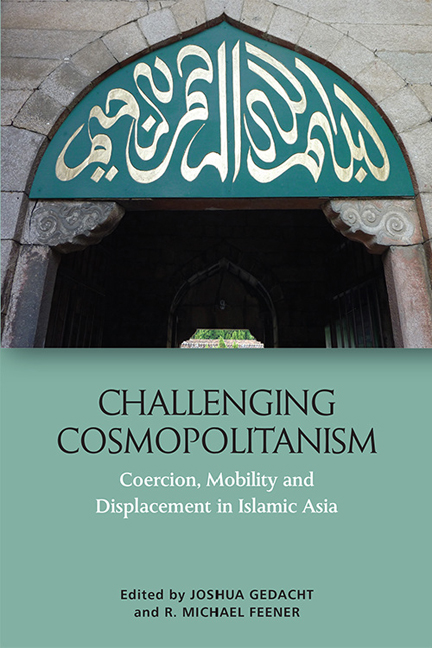Book contents
- Frontmatter
- Contents
- Preface
- 1 Hijra, Ḥajj and Muslim Mobilities: Considering Coercion and Asymmetrical Power Dynamics in Histories of Islamic Cosmopolitanism
- 2 Islamicate Cosmopolitanism from North Africa to Southeast Asia
- 3 Sufi Cosmopolitanism in the Seventeenth-century Indian Ocean: Sharīʿa, Lineage and Royal Power in Southeast Asia and the Maldives
- 4 The White Heron Called by the Muezzin: Shrines, Sufis and Warlords in Early Modern Java
- 5 Variations of ‘Islamic Military Cosmopolitanism’: The Survival Strategies of Hui Muslims during the Modern Period
- 6 Writing Cosmopolitan History in Nineteenth-century China: Li Huanyi’s Words and Deeds of Islamic Exemplars
- 7 The ‘Shaykh al-Islām of the Philippines’ and Coercive Cosmopolitanism in an Age of Global Empire
- 8 Bordering Malaya’s ‘Benighted Lands’: Frontiers of Race and Colonialism on the Malay Peninsula, 1887–1902
- 9 Afghanistan’s Cosmopolitan Trading Networks: A View From Yiwu, China
- Notes on the Contributors
- Index
2 - Islamicate Cosmopolitanism from North Africa to Southeast Asia
Published online by Cambridge University Press: 01 May 2021
- Frontmatter
- Contents
- Preface
- 1 Hijra, Ḥajj and Muslim Mobilities: Considering Coercion and Asymmetrical Power Dynamics in Histories of Islamic Cosmopolitanism
- 2 Islamicate Cosmopolitanism from North Africa to Southeast Asia
- 3 Sufi Cosmopolitanism in the Seventeenth-century Indian Ocean: Sharīʿa, Lineage and Royal Power in Southeast Asia and the Maldives
- 4 The White Heron Called by the Muezzin: Shrines, Sufis and Warlords in Early Modern Java
- 5 Variations of ‘Islamic Military Cosmopolitanism’: The Survival Strategies of Hui Muslims during the Modern Period
- 6 Writing Cosmopolitan History in Nineteenth-century China: Li Huanyi’s Words and Deeds of Islamic Exemplars
- 7 The ‘Shaykh al-Islām of the Philippines’ and Coercive Cosmopolitanism in an Age of Global Empire
- 8 Bordering Malaya’s ‘Benighted Lands’: Frontiers of Race and Colonialism on the Malay Peninsula, 1887–1902
- 9 Afghanistan’s Cosmopolitan Trading Networks: A View From Yiwu, China
- Notes on the Contributors
- Index
Summary
Who are Islamicate cosmopolitans? At once discrete and local, they are not reducible to an abstract descriptor labelled ‘Islamicate Cosmopolitanism’, though that category can be used as a placeholder for discrete complexities. Islamicate cosmopolitans are subjects of empires and citizens of nation-states. Both Muslim and non-Muslim, they hail from disparate parts of the known world and from distant epochs of recorded history. Above all, Islamicate cosmopolitans are freestanding agents who challenge the limits of imposed identities, whether religious or cultural, temporal or spatial.
Summary Overview
The two parts of Islamicate cosmopolitan(ism) must be parsed to grasp its full potential for redefining multiple actors in diverse contexts. Though complimentary, they are not equal. Because ‘cosmopolitan’ precedes and exceeds ‘Islamicate’, it is important to note at the outset what is not truly cosmopolitan but rather what might be regarded as counterfeit cosmopolitan. I will argue that the true cosmopolitan is focused inwardly, on conscience and moral choices. Accent on the inner gaze is a needful corrective to the discourses of self-satisfied upper-class travellers, aristocrats and state officials, which cannot, and should not, be conflated with a genuine orientation of openness to cultural and religious difference or a desire to see a world larger than oneself. The self-centred streak of such ‘cosmopolitanism’ remains elitist and voyeuristic. At times paternalistic or vernacular (or both), it privileges a flawed north European cosmopolitan exemplar like Richard Burton, or in the annals of Islam, the medieval Moroccan peripatetic, Ibn Baṭṭūṭa. Their engagement in travel, cultural tourism and literary exploration, notably lack moral rigour or self-criticism, in short, the inner gaze that opens the self to the world rather than simply embracing pleasure as a ‘natural’ pursuit, whether domestic or overseas.
An Islamicate cosmopolitan refracts a Muslim experience that honours its religious antecedents while also expanding them. Just as ‘Muslim’ applies to actors – individual and collective – within the umma, ‘Islamic’ evokes the norms and values that project Islam as an ethical and metaphysical ideal for Muslims. In other words, both ‘Islamic’ and ‘Muslim’ have distinctly religious connotations. ‘Islamicate’, by contrast, projects a surplus of meaning beyond either ‘Muslim’ or ‘Islamic’.
- Type
- Chapter
- Information
- Challenging CosmopolitanismCoercion, Mobility and Displacement in Islamic Asia, pp. 30 - 52Publisher: Edinburgh University PressPrint publication year: 2018



